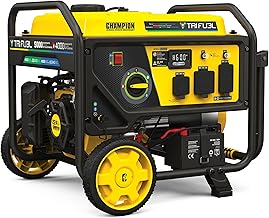What Size Generator Do I Need to Run a Refrigerator?
What Can a 5000-Watt Generator Run?
April 19, 2025Where Are Champion Generators Made?
April 19, 2025Ensuring your refrigerator remains operational during power outages or while off-grid is crucial to prevent food spoilage. Selecting the appropriate generator size involves understanding your refrigerator’s power requirements and matching them to a generator that can handle both the starting and running wattage.

Understanding Refrigerator Power Requirements
Refrigerators require two types of power:
- Starting (Surge) Wattage: The initial surge of power needed to start the compressor, typically 2–3 times higher than the running wattage.
- Running (Continuous) Wattage: The power needed to keep the refrigerator operating continuously.
Typical Wattage Requirements by Refrigerator Size
| Refrigerator Size | Running Wattage (Watts) | Starting Wattage (Watts) |
| Mini Fridge (3–5 cu. ft.) | 100–300 | 400–600 |
| Standard Fridge (16–22 cu. ft.) | 300–800 | 900–2,400 |
| Large Fridge (25+ cu. ft.) | 800–1,200 | 2,400–3,600 |
Note: These values are approximate. Always refer to your appliance’s specifications for exact figures.
Calculating the Right Generator Size
To determine the appropriate generator size:
- Identify Your Refrigerator’s Starting and Running Wattage: Check the appliance’s manual or label for wattage information.
- Add a Safety Margin: It’s advisable to choose a generator with at least 20% more capacity than your refrigerator’s starting wattage to ensure reliable performance.Example Calculation:
For a standard refrigerator with a running wattage of 500 watts and a starting wattage of 1,500 watts:
- Required Generator Starting Capacity: 1,500 watts + 20% = 1,800 watts
- Required Generator Running Capacity: 500 watts + 20% = 600 watts
In this scenario, a generator with a minimum starting capacity of 1,800 watts and running capacity of 600 watts would be suitable.
Recommended Generator Sizes
Based on typical refrigerator requirements:
- Mini Fridges: A 1,000-watt generator should suffice.
- Standard Refrigerators: A generator between 2,000 to 3,000 watts is recommended.
- Large Refrigerators: Consider a generator with at least 3,000 to 5,000 watts.
Additional Considerations
- Multiple Appliances: If you plan to power additional devices alongside your refrigerator, calculate the total wattage required and select a generator that can handle the combined load.
- Fuel Type and Efficiency: Consider fuel availability and consumption rates. Inverter generators are often more fuel-efficient and provide cleaner power, suitable for sensitive electronics.
- Noise Levels: For indoor or residential use, check the generator’s noise rating to ensure it meets acceptable sound levels.
Selecting the right generator size for your refrigerator involves understanding its power requirements and choosing a generator that can handle both the starting and running wattage with an added safety margin. By considering these factors, you can ensure your refrigerator remains operational during power outages or off-grid situations, keeping your food safe and fresh.
Note: Always consult your refrigerator’s user manual for specific power requirements and seek professional advice if uncertain about generator selection.
